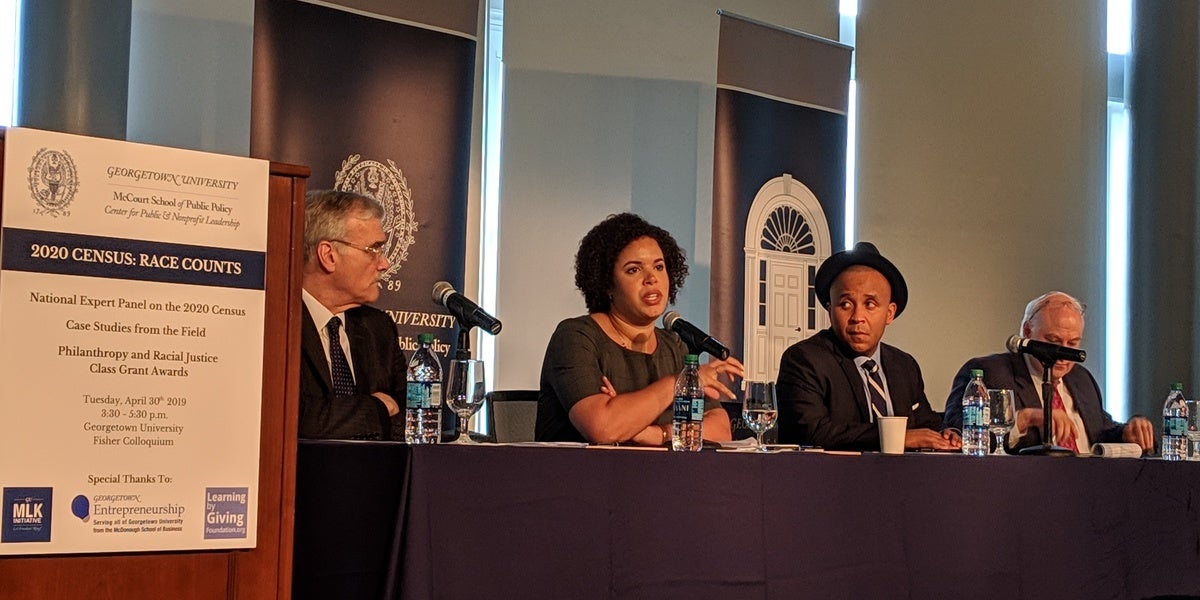2020 Census: Race Counts

Posted in News Story
On April 30th, the Center for Public and Nonprofit Leadership hosted its annual public issue forum, 2020 Census: Race Counts. The event included 1) a discussion with national experts on why a fair census count is so critical, 2) release of new research on racial equity, and 3) graduate student awards of $20,000 to D.C. nonprofits working on racial justice.
The 2020 Census
The decennial census is the basis for the allocation of political representation, billions in federal resources, and decision-making in the public, private, and nonprofit sectors. Undercounted communities are not evenly distributed across the country, and neither are the implications in terms of resources and representation, which last a decade. People of color have been historically undercounted, especially people of color who are also low-income, mobile, LGBTQ or immigrant. An accurate census count is critical to overcome the perpetuation of historical and political barriers to full participation, voice, power, and equity in our democracy.
Four experts joined us for the discussion:
- Bob Groves, Ph.D., Georgetown Provost and former Director of the Census Bureau
- Beth Lynk, Census Counts Campaign Director, The Leadership Conference on Civil & Human Rights
- Gary Bass, Ph.D., Executive Director, The Bauman Foundation
- Rashad Robinson, Director, Color of Change
Case Studies from the Field
Two case studies on the 2020 Census and racial equity within public education were presented by Erica Turner, Waldemar A. Nielsen Research Fellow, and Ashley Pollard, Pablo Eisenberg Public Interest Research Fellow, respectively. The case studies can be accessed here:
- The Role of Foundations and Nonprofits in the 2020 Census
- Advancing Racial Equity in Seattle Public Schools
Philanthropy and Racial Justice Class
Graduate students awarded a total of $20,000 in grants to the following four DC nonprofits for their racial equity work:
- Black Swan Academy
- Critical Exposure
- Free Minds Book Club & Writing Workshop
- Safe Places for the Advancement of Community and Equity
Special Thanks to MLK Initiative: Let Freedom Ring, Georgetown Entrepreneurship Initiative, and the Learning by Giving Foundation for their support.
Additional Resources on the 2020 Census
To learn more about the 2020 Census, we have compiled a list of resources:
Why the Government Wants to Know Citizenship Status
An op-ed in the New York Times by Vanita Gupta, President of the Leadership Conference on Civil and Human Rights. After the release of government emails as a part of a federal lawsuit, Gupta argues that the motivation behind the addition of a citizenship question was the anti-immigrant agenda of certain members of the current administration.
Every Person Counts: Why the Census Must Be Rescued
An op-ed in the Chronicle of Philanthropy by Gary D. Bass, Executive Director of the Bauman Foundation, and others. The authors make the case that philanthropy ought to get involved in the 2020 census because of government shortfalls and indiscretions including protracted underfunding and the proposed addition of a citizenship question.
In Donald Trump’s Census, Who Counts?
An article from the New York Times Magazine by author Emily Bazelon, which summarizes the 2020 census conflict so far and describes the negative effects of a potential undercount.
An interactive map developed by Steve Romalewski at The City University of New York (CUNY )Mapping Service, which displays hard-to-count (HTC) populations. It has a number of useful overlays such as data about access to broadband and public library locations.
Reports from Andrew Reamer, a professor of public administration at George Washington University, which present state data on how the census influences the distribution of federal funds and affects state budgets.
Census 2020 State Landscape Scan
A report developed by Grassroots Solutions and the Bauman Foundation, which presents several cases of philanthropy playing a role in the 2020 census in six states: Michigan, Minnesota, New Jersey, New Mexico, New York, and Washington.
Census 2020 Messaging Testing Results
National field partners were funded to conduct get-out-the-count messaging research to identify messages that resonate with historically hard-to-count communities.
The Brennan Center’s Census Page
A useful set of documents from the Brennan Center, a nonpartisan nonprofit focused on democracy and justice, including basic facts about the census, coverage of ongoing census litigation, and analysis of the citizenship question and data privacy concerns.
The collected tweets of Hansi Lo Wang, a national correspondent for NPR covering the census.
